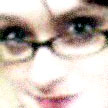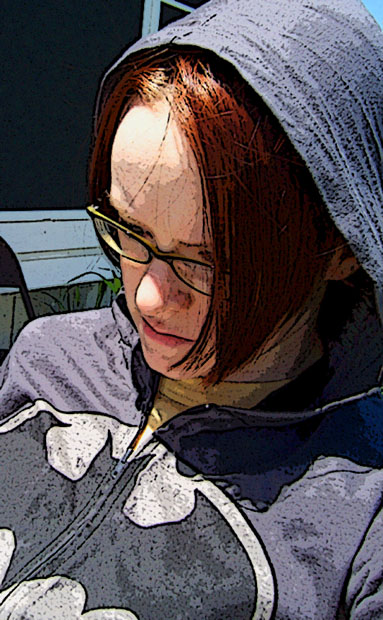I was planning to write about how reading about the board of trustees duties this week coincided with the abrupt announcement of Dr. Bataille's departure... but I read a classmate's post that mentioned library and museum missions, and it sparked lots of thoughts!
When I first started my MS in library science in 2002, I didn't understand the academic library mission. Library missions tend to be more straightforward in public libraries than university libraries, probably for the same reasons that university missions themselves are complex and the subject of much debate!
At any academic library (meaning college & university libraries, not primary or secondary school libraries) there is definitely the preservation or "conserving knowledge" mission that Bogue/Aper describes. The weight of that mission varies from institution from institution--part of the variance is related to the institutional mission, part of it relates to individual library collections.
We're currently refashioning our UNT Libraries mission statement because it does not adequately express our vision of the libraries. We have a particularly rich preservation mission, because we have a number of unique collections in the UNT Archives (like university records and photographs), the Rare Books Room (old manuscripts, miniature books), the Music Library (LP's from the Library of Congress, jazz scores), etc. This is part of the "conservation of knowledge" mission that Bogue mentions, but it's also simply the physical preservation of old and valuable materials.
The "conservation of knowledge" portion is expressed in the UNT Digital Library, where all electronic theses/dissertations written by UNT students are kept; the same department is also working with university leaders on a digital repository to store faculty research and publications. The subject librarians for each department similarly work with their associated academic departments (for instance, mine is the Dept. of Philosophy and Religion Studies) to collect and preserve all publications by their faculty in that department, particulary print books.
But we have two more imperative missions. The first, perhaps most obvious, mission is to serve the students, staff, and faculty of UNT by providing the information that they need. This is done in all kinds of ways (reference question answering, workshops, collection purchasing, developing new services) and delivered in person, by phone, text message, IM, online chat software, email, fax--you get the idea, any format you want! This mission in large research universities tends to be focused more on support of faculty research, so that the books purchased are oriented more toward faculty needs than those of undergraduates needing term paper resources. Similarly in liberal arts colleges, the library collection tends to focus on general resources for undergraduates, and less in-depth materials that support faculty research (although this is often supported through services like Inter-Library Loan). UNT of course being a mixed-mission university, the libraries are similarly mixed in their collection and service focus.
Finally, the UNT Libraries have also been designated as a federal and state depository library. This is a designation that brings with it a broad collection of nearly one million documents produced by the government that our library is given for free, assuming we meet government regulations of a depository library. As a federal depository, for instance, we are by law required to serve any member of the public with our documents collection. This goes beyond merely helping people look up regulations on adoption or do-it-yourself divorce forms; our documents collection is rich with primary historic resources and many valuable maps and books that are worth thousands of dollars a piece. This is another key piece of keeping American democracy alive: providing the public free and permanent access to the documents that created our government and the documents that our government creates. It's all part of that famous quote attributed to Thomas Jefferson, the key to a democracy is having an informed citizenry.
So in a broad sense, our particular mission at the UNT Libraries is to preserve a variety of rich, unique collections, to support our university's students, staff, faculty, and to serve the general public. It's a thrilling mission to serve every day, let me tell you!!
I do have to mention that Bogue/Aper's comment on page 21 about digital library access pushed a few of my buttons. I'm a professed bibliophile, but I'm also a hugely geeky techie and love to play with technology--which comes in handy, since my title is Librarian for Digital Collections! One of my primary research interests is library support for distance learners, which goes far beyond mere email reference answers or e-book collections.
Bogue/Aper's statement about the future of libraries makes me feel conflicted, as this great debate in the library world always does. Page 21 says that "we are probably not far from that moment when we will not go to the library but simply purchase a computer disk or other information storage device... and take it home... and have every page of the library available at our intellectual disposal. Such convenience and power, however, may never replace the joy and wonder that comes from browsing the quiet and musty stacks of libraries."
Well... yes and no. Certainly our library catalog can be accessed online, as can many of the e-books, online gov documents, and databases that allow us to access the majority of our journal articles electronically. And that's fantastic--even working in the library, I love being able to email myself articles instead of walk down four floors to make a photocopy. But no, the printed matter isn't going anywhere soon. Full-text searching of our digital collections is a vast improvement on searching a paper index, but talk to any art student about trying to find a certain visual reference for a sketch, and that's much more easily accomplished by visually browsing tangible books than searching using a textbox online. And those unique collections at UNT libraries? We're digitizing them, but researchers will always want to look at the originals, to mine more information from the "real thing," and to touch the actual objects that past giants touched.
Bogue/Aper do acknowledge some of the physical pleasures of books in the "joy and wonder" part of that statement... but as a librarian I have to huffily protest the stereotypical image of "quiet and musty stacks!" My guess is that my personal appearance wouldn't fit into their standard definition of "librarian," either... but that's a conversation for another time and another class.
Hmm. Didn't mean to provide such a wordy post; the words "library" and "democracy" tend to get me very excited!
Subscribe to:
Post Comments (Atom)



1 comment:
My name is Louis Bogue, from Dunedin, Fla."louis.bogue@yahoo.com"Can you tell me About the "bogue/alper you refer to in your article, thank you
Post a Comment